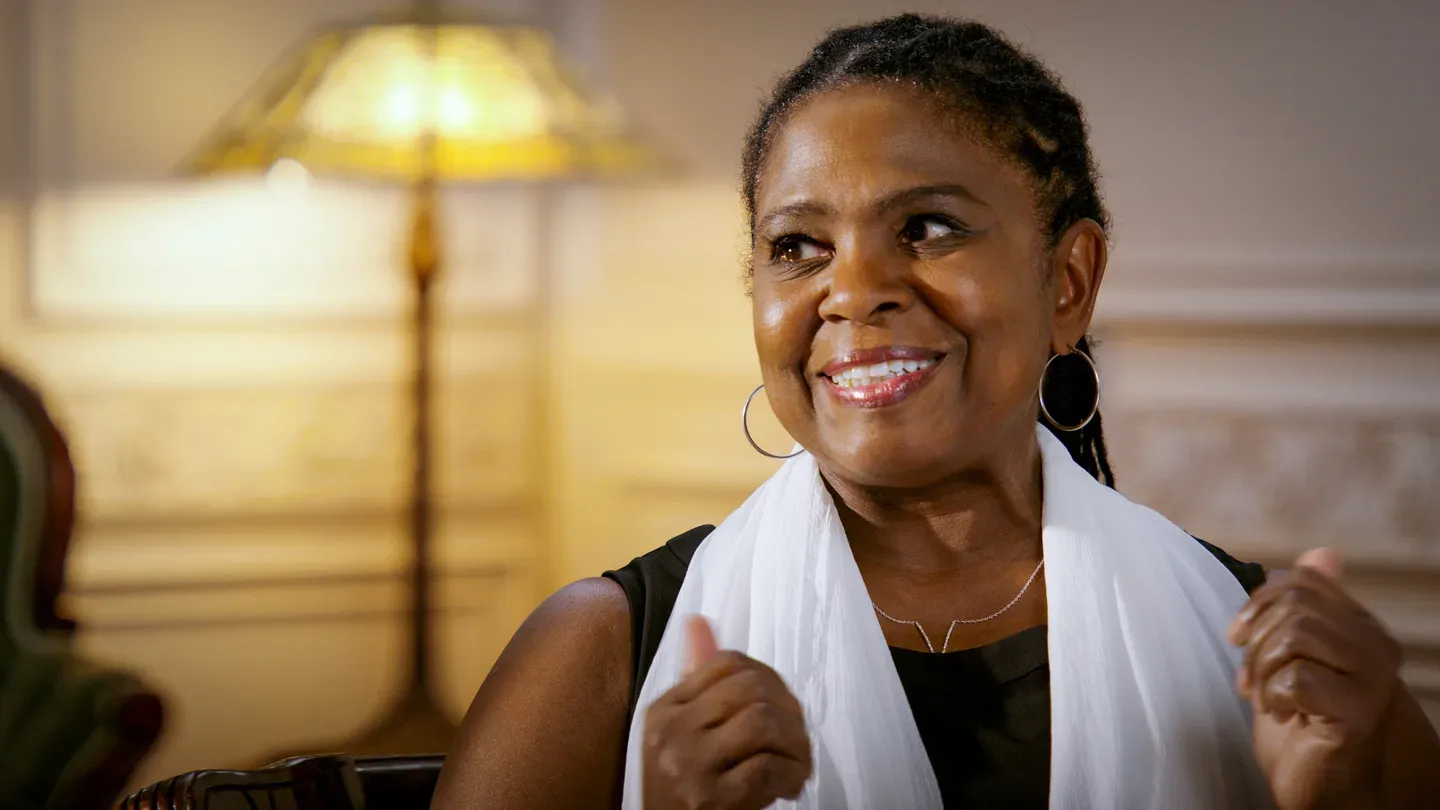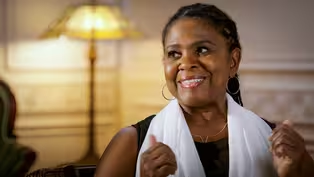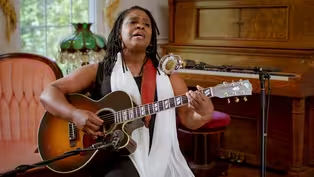

Ruthie Foster
Season 6 Episode 4 | 24m 41sVideo has Closed Captions
Ruthie Foster can make you think you’re hearing favorite songs for the first time.
Blues artist Ruthie Foster has a voice like liquid gold and a distinctive way with old songs that makes you think you’re hearing them for the first time.
Problems playing video? | Closed Captioning Feedback
Problems playing video? | Closed Captioning Feedback

Ruthie Foster
Season 6 Episode 4 | 24m 41sVideo has Closed Captions
Blues artist Ruthie Foster has a voice like liquid gold and a distinctive way with old songs that makes you think you’re hearing them for the first time.
Problems playing video? | Closed Captioning Feedback
How to Watch David Holt's State of Music
David Holt's State of Music is available to stream on pbs.org and the free PBS App, available on iPhone, Apple TV, Android TV, Android smartphones, Amazon Fire TV, Amazon Fire Tablet, Roku, Samsung Smart TV, and Vizio.
Buy Now
Providing Support for PBS.org
Learn Moreabout PBS online sponsorship- [David] Ruthie Foster's voice is an amazing instrument, it's taken her all around the world.
Whether she's fronting a full military band or playing solo with her acoustic guitar, her voice is simultaneously powerful and intimate.
Add that to her musical background and training, and she can make you hear new things and song that you thought you knew.
(clapperboard claps) (soft guitar music) ♪ I come from Alabama ♪ ♪ With this old banjo on my knee ♪ ♪ And I'm bound for Louisiana ♪ ♪ My own true love for to see ♪ ♪ It rained all night the day we left ♪ ♪ The weather was bone dry ♪ ♪ The sun so hot ♪ ♪ I nearly froze myself ♪ ♪ Susannah, don't you cry ♪ ♪ And I say, oh oh Susannah ♪ ♪ Don't you cry for me ♪ ♪ Because I come from Alabama ♪ ♪ With this old banjo on my knee ♪ (soft guitar music) ♪ It rained all night the day we left ♪ ♪ The weather was bone dry ♪ ♪ The sun so hot ♪ ♪ I nearly froze myself ♪ ♪ Susannah don't you cry ♪ ♪ And I say, oh oh Susannah ♪ ♪ Don't you cry for me ♪ ♪ Because I come from Alabama ♪ ♪ With this old banjo ♪ ♪ This old banjo ♪ ♪ This here old banjo on my knee ♪ - Ruthie, what a beautiful voice.
I can't even express how beautiful that is to me.
- Oh thank you, thank you David, I appreciate it.
- When did you realize you had a voice like that, that can move people?
- I'm still working on that.
(Ruthie laughs) - Oh well, you moved me.
- Well you know, I used to sing to myself in like fifth-sixth grade, but I never wanted to sing out.
So I would sit in my room and just sing to the radio, and I remember my mother coming in one day, and she said, "Girl, you just need to open your mouth and just sing."
And shortly after that, I had to find a solo to sing in my church, and because everybody had to have a solo in this church where I come from.
- A particular song for them?
- You just pick any particular spiritual to sing as a solo and it was my turn, and that's when I had to, I had to put my weight in it then.
- What did you pick?
- I picked "Pass Me Not, O Gentle Savior."
- Can you sing just a little of it for us?
- Sure.
♪ Pass me not, o gentle savior ♪ ♪ Hear my humble cry ♪ ♪ O savior, o savior ♪ ♪ Hear my humble cry ♪ ♪ While on others thou art calling ♪ ♪ Do not pass me by ♪ - I bet they loved that.
- My grandmother did, yeah.
You know, it was one of those moments where I sang really quiet at first, and then I saw my grandmother do this from the amen corner, and then I had to step it up a little bit and then she leaned back.
I could only see the brim of her hat.
- Sending you signals?
- Uh-huh She let me know.
She worked with me on being comfortable in front of people.
- You were from Texas, actually near a place where I was born in Central Texas.
- Oh yeah!
- Yeah, so church was a big important part of life and music in the church is super important.
- All week long you had choir practice, you had something on every other day, yeah it was very important.
- What happened after that?
- Well you know, I started playing around in the community at the community centers and different churches.
My mother was, I could say my mother was my first manager, because I would come in Friday from school and she let me know, which church I was gonna be playing at that Sunday.
- Oh really?
- Oh yeah.
- Wow, so she was behind you?
- Yeah, yeah, she would let me know and you know taking care of my fingers, because I was playing guitar and piano at the time, about seventh grade, yeah.
- Who taught you guitar?
You're a great guitar player.
- Thank you.
I actually, I spent a lot of time teaching myself guitar, but my piano teacher's husband actually played guitar.
So I would go over to my piano teacher's house to take my piano lesson, and then her husband would come in from work, and he'd work with me on a few chords on the guitar.
So I learned them at the same time.
I never really wanted to be upfront to...
I didn't wanna be that upfront singer for a long time.
- Why is that?
- I have a lot of great singers in my family, it's intimidating.
- A lot of competition, huh?
- Still.
(Ruthie and David laughs) - But are you the only pro in the family?
- Yeah, in my generation.
I had uncles who traveled all around Texas singing together, singing spirituals in different churches, on both sides of my family, my mother's and my father's side.
- So when did you go into the Navy and join the Pride band?
- I went into the Navy shortly after I graduated from music school, so that would be early '80s.
- And you were in the band, right?
- I was in the band after a year.
My first year was spent in San Diego at a helicopter squadron.
I was a electronics maid over there and that was...
It was a little too much like work for me.
(David laughs) So I switched back over to music, which is not really easy to do because-- - That's a great band.
- These guys and girls are really, really great.
They're the elite band.
So yeah, finally got into music school and you have to go back to school when you-- - To be in the band?
- Get switched.
To be in the band, it's six months of school.
So everything I learned in music school before that, I had to unlearn and learn the military way.
- But they were playing funk music and all kind of stuff, weren't they?
- Little bit of everything.
You went from Sousa, John Phillip Sousa, to urban music, to Keith Sweat, to country music, yeah.
I played piano, I was a vocalist for the Big band.
- Meaning you had horns and-- - Yeah and 17, 18 pieces behind me.
- Man, what did you learn from that?
- I learned that you can't outsing brass.
(David laughs) - Good lesson.
- You cannot.
- You wanna keep your voice.
- Yeah.
It's really about phrasing, and I spend a lot of time studying people like Ella Fitzgerald, Frank Sinatra, Nancy Wilson, Sarah Vaughan, because it was...
I love their phrasing and then I found out that that's really what it was about.
It was about finding those holes while the bands, you're standed in front of saxophones, trombones and trumpets, you're not gonna outsing that.
So it's about finding the creases.
(melodious guitar music) ♪ Trying to find a new home ♪ ♪ Trying to write a new song ♪ ♪ Trying to find a rhythm, that'll help me ♪ ♪ Ooh, I wanna get through it ♪ ♪ Keep singing the blues ♪ ♪ Everybody's saying, ♪ ♪ "You gotta get a way in ♪ ♪ "Go deal with the real stuff buddy" ♪ ♪ I don't know if it's gonna be true enough ♪ ♪ Well, keep singing the blues ♪ ♪ Oh , you know I'm just passing on ♪ ♪ Singing the same old songs ♪ ♪ Sometimes it feels so right and I don't feel all alone ♪ ♪ But when the music fades and the crowd drives away ♪ ♪ I'm starring at the mirror, yeah ♪ ♪ Just singing the blues ♪ ♪ Hmm I'm staring at the mirror, yeah ♪ ♪ Still singing the blues ♪ ♪ You know I can pop a little upbeat reggae ♪ ♪ And I can lift and appreciate ♪ ♪ But I rather be high oh, yeah ♪ ♪ Singing the blues ♪ ♪ Oh I've been in and out of soul ♪ ♪ Even rock and roll ♪ ♪ But a little baby blue play ♪ ♪ Never, never, never, never gets old ♪ ♪ Yeah, I gotta have me some blues oh ♪ ♪ Oh you know I'm just passing on ♪ ♪ Singing the same old songs ♪ ♪ Sometimes it feels so right and I don't feel all alone ♪ ♪ But when the music fades and the crowd drives away ♪ ♪ I'm starring at the mirror ♪ ♪ Oh, singing the blues ♪ ♪ Yeah, I'm staring at the mirror, oh ♪ ♪ Still singing the blues ♪ ♪ I'm staring at the mirror, yeah ♪ ♪ Staring at the mirror, oh ♪ ♪ Staring at the mirror, oh ♪ ♪ Singing the blues ♪ "Singing the Blues" is this song that I had been working on for a few years, and I was on a cruise, I was on the Blues Cruise and I got a chance to hear Bobby Blue Bland play a couple of times while on the cruise.
It started out more of a folky, really slow groove, but something happened.
The more I sat and listened to Blue's bands playing, I decided to change the groove a little bit.
So that's what the change is with "Singing the Blues."
And there's not one Blues leak in it, but the song is about my love for the Blues.
And it's not the Blues where you're feeling down about something, but it's more of a witness to your life and what you love about this particular genre.
Singing the Blues is about what I love about the Blues.
Yeah I started small, in a little club in Charleston, South Carolina, where I was stationed and I got out there, and I started singing folk music there as well as my own music.
I had started to write a little bit and so that's what I would do Friday, Saturday nights.
Is just kind of hone in my, you know, just getting my chops for just being able to play and sing my own material.
- And then you got a serendipitous meeting with somebody that took it to New York, what happened there?
- I recorded a four song demo that I had been sitting on since music school, and if somebody was in Charleston on a vacation, and they came into this club where I was playing, and they liked the way I sang and asked if I had anything, and I said, "Well, I have this four demo tape."
And they went up, I didn't know that this particular fellow was working with Craig Kallman with Atlantic Records.
And Craig Kallman called me one night and says you know, "My name's Craig Kallman.
"I'm with Atlantic Records, "and I like the way you sing "and I'd love to hear you in person.
"I'm gonna be in Georgia at this time.
"Can you run over and I can hear you?"
- Wow.
- Yeah, and the first thing you're thinking, no, you're not.
- Yeah, right, who is this?
- Right.
(David chuckles) So yeah, I ended up going over to sing for him and within months I was signed with Atlantic Records, packed my pickup truck, and drove to New Jersey and got a place there, and they set me up with equipment for a home recording studio, and that's what I was doing for three years I did that up there.
It's interesting when you sign with a major record label, it's about knowing what you're signing.
And it turned out to be more of a management development contract rather than a recording contract.
Which means they don't have to release anything you write and they didn't.
- To use the time wisely?
- I did.
I used the label's name on everything I did, pictures, you know everything, posters, you know, Atlantic recording artist.
- Of course-- - Why not, right?
- You were.
- And it opened a lot of doors.
And it gave me a chance to just play New York, all of the featured venues there, it got me through the door and I got a chance to rub shoulders with people who wrote for Whitney Houston, Barbara Streisand, you know just Anita Baker, and a lot of producers.
So I got a chance to really learn the craft too, and get to the bottom of what type of songs I wanted to sing, and how to skip genres and what those particular genres are looking for.
(soft guitar music) ♪ Love is a burning thing ♪ ♪ And it makes a fiery ring ♪ ♪ Bound by wild desire ♪ ♪ I fell into a ring of fire ♪ ♪ And I fell into a burning ring of fire ♪ ♪ I went down and the flames went higher ♪ ♪ And it burns, burns, burns ♪ ♪ Oh yeah, it burns, burns, burns ♪ ♪ That ring of fire ♪ ♪ The ring of fire ♪ ♪ The taste of love is sweet ♪ ♪ When hearts like ours meet ♪ ♪ I fell for you like a child ♪ ♪ And oh, the fire went wild ♪ ♪ And I fell in to a burning ring of fire ♪ ♪ I went down and the flames went higher ♪ ♪ And it burns, burns, burns ♪ ♪ Oh yeah it burns, burns, burns ♪ ♪ That ring of fire ♪ ♪ That ring of fire ♪ ♪ Ooh yeah ♪ ♪ Let it burn, let it burn, yeah ♪ ♪ Let it burn, let it burn, yeah ♪ ♪ Let it burn, let it burn, yeah ♪ - "Ring of Fire", I took the song that I love, I love country music, I love Johnny Cash.
And I wanted to do something different with this song, and I found myself up really late one night after a long tour and couldn't sleep, and I was playing around with the major seven chords 'cause they're just relaxing for me.
And "Ring of Fire" actually fit, the lyrics fit over these chords.
And the more I played with the song, the more I realized well, this might work, let's try this.
And you know what I love about what I've done with this particular version of "Ring of Fire", is that through changing it into what may be called soul, this a soul version of "Ring of Fire", I'm hoping I'm introducing the song to people who won't even listen to country music and don't know anything about Johnny Cash's music.
It's a song that needs to be heard.
- Where do you see going down the road to be five years from now or so?
- Five years from now?
Wow, well I think you know, becoming the next Beyonce is out.
That's not gonna happen.
Yeah, my dance stays are over.
You know, I'm just hoping I'm still writing and singing songs that mean something that... Because music for me is healing and it opens doors, it opens hearts, it changes minds.
You know, it's an important element, especially with what we've gone through in the last year and a half.
- Well, I think you've done some healing here, to everybody watching this, thank you.
- I hope so.
(air whooshing)
Episode 4 Preview | Ruthie Foster
Video has Closed Captions
Preview: S6 Ep4 | 30s | Ruthie Foster can make you think you’re hearing favorite songs for the first time. (30s)
Ruthie Foster - “Ring of Fire”
Video has Closed Captions
Clip: S6 Ep4 | 3m 33s | Blues vocalist Ruthie Foster sings “Ring of Fire.” (3m 33s)
Providing Support for PBS.org
Learn Moreabout PBS online sponsorshipSupport for PBS provided by:













